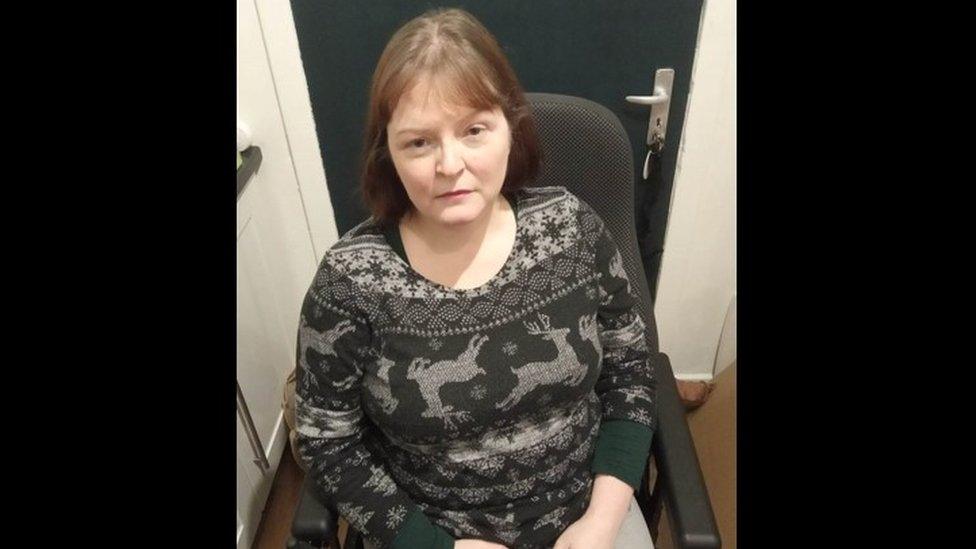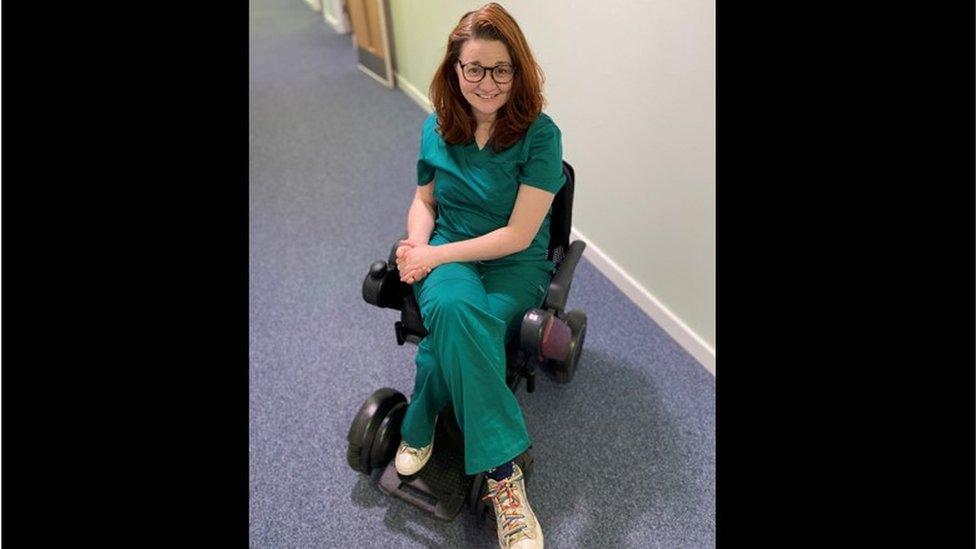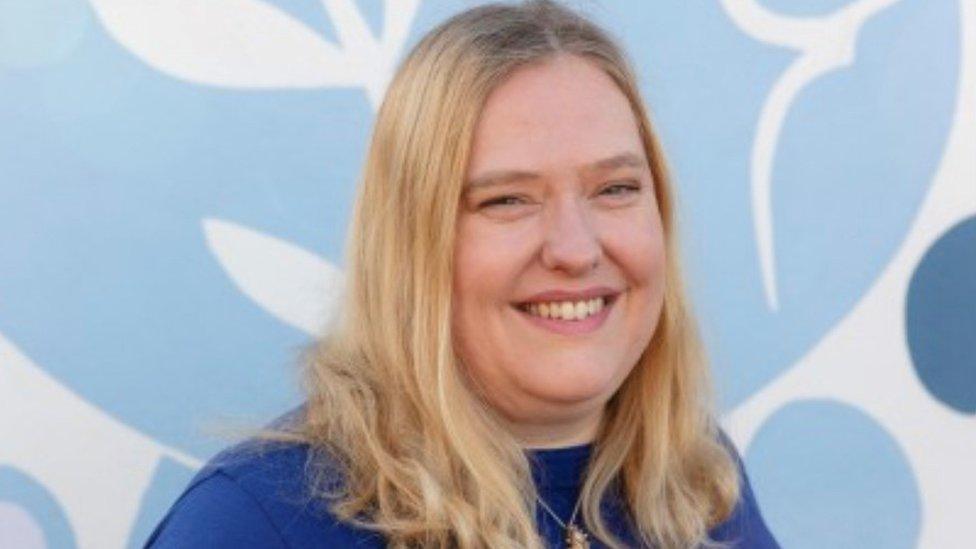NHS crisis: Why are disabled people disproportionately affected? (original) (raw)
 Image source, Laura Miller
Image source, Laura Miller
The NHS is at crisis point. For many disabled people, trips to A&E or GPs can be quite regular, but the current hospital delays and lack of staff is impacting their overall health and has made them scared.
Laura Miller, 50, is no stranger to hospitals, but she's never seen anything like this winter.
"I witnessed and experienced such severe conditions I feared for my life," the 50-year-old wheelchair-user told BBC Access All. After her last hospital visit, she sought counselling for PTSD.
This winter is the worst in NHS history. After two years of Covid-19, when people did their best to avoid hospitals, they are returning with exacerbated conditions. A fifth wave of Covid and the worst flu season in a decade have hit, alongside low staffing levels and strike action.
The latest government figures revealed that in December, the average wait for an ambulance hit 90 minutes while A&E waits of over four-hours reached their highest level.
For disabled people - a community which disproportionately relies on the NHS to keep them healthy - these statistics are worrying.
Laura uses a wheelchair and has multiple health conditions including asthma and Postural Tachycardia Syndrome (PoTS), which is an abnormal heart rate which can cause fainting.
She regularly needs emergency care, but remains traumatised by an incident in September when she went to A&E with Covid-19.

LISTEN: You can hear more from disabled patients and doctors and their particular fears about this crisis on BBC Access All.
Plus Lauren Mahon from You, Me and the Big C chats about cancer and bringing the award-winning podcast to an end.


"The nursing staff told me I had to leave the bed I was in, as other patients were dying. As soon as I attempted to get out of bed, I collapsed and was shouted at by a doctor."
She says she was then "wheeled through to a room by myself" and left there despite needing the bathroom and water but couldn't achieve these alone.
Unable to remain in a sitting position, she manoeuvred herself out of the wheelchair.
"I lay on the floor in a room that staff were walking by. No one came to my assistance."
Eventually, a hospital manager found her, but she had already spent significant time without the care she required.
"The staff had left a disabled adult, sick with Covid, in a room with no access to the toilet, to water, and who was now traumatised after being forcibly removed and shouted at.
"I realised that day that my disabled friends were about to enter a level of neglect even worse than they have previously experienced."
The disabled community is already feeling scarred. In 2021, the Office For National Statistics revealed that disabled people accounted for six in 10 Covid-19 deaths and many are fearful of returning to those numbers.
GP, Dr Hannah Barham-Brown, based in Selby, understands those fears as a doctor who is disabled herself.
"The whole NHS, right now, is a bin-fire," she says.
 Image source, Dr Hannah Barham-Brown
Image source, Dr Hannah Barham-Brown
"Disabled people disproportionately need the NHS. We have conditions that need NHS care a lot more often, so we're more likely to need the NHS in an emergency capacity."
As well as emergency care, she says regular appointments, that many disabled people require to maintain basic good health, are being postponed while clinicians are pulled away to deal with the crisis in A&E and on wards.
"So the waiting lists grow and so our health outcomes are getting worse."
Earlier this month the government said the NHS would receive £250m to buy 2,500 beds in care homes, so some patients who are ready to be discharged from hospital, but need additional support, can be relocated.
Labour's shadow health secretary, Wes Streeting, called it "another sticking plaster" but frustrated Dr Hannah takes his analogy further.
"It's a wet plaster hanging off, letting infection in because we don't have beds sitting empty in social care [settings]."
She says disabled people are struggling to get adequate care anyway, let alone re-allocating available beds in a social care industry with 160,000 job vacancies.
"If the staff don't exist, if the beds don't exist, then this is not a solution, is it?"
It's not just a physical medical emergency. The toll on patients with mental health needs or developmental conditions is acute.
Anna Morell, who uses mobility aids and works for Disability Rights UK, regularly needs to visit her local hospital. She says she was "gobsmacked" by the lack of pastoral care when she made several visits to A&E over Christmas.
"There were people that were in mental health distress who'd been waiting 14 hours while suicidal with no help. It's the worst place for mental health."
 Image source, Anna Morell
Image source, Anna Morell
She said others with learning disabilities and autism were left in waiting rooms, "rocking" back and forth.
Following the shocking statistics related to outcomes for disabled people in the pandemic, she says: "It's scary for disabled people because the upshot is with this kind of crisis, we're going to die."
Anna says as well as cash and staffing injections into the NHS, she wants Cabinet members, whose remit covers health, to spend time on the front line to understand the reality.
"They're looking at spreadsheets. If they're not doing things on a human basis, they have no idea what needs to be done."
The Department for Health and Social Care said it was "prioritising health and care services with up to £14.1bn over the next two years to address the most pressing issues facing the NHS and social care".
It recently introduced a new requirement that health and care staff receive learning disability and autism training "appropriate to their role".
Despite the crisis, Dr Hannah, who used to be deputy leader of the Women's Equality Party, says if you need health care, you must seek it out.
She advises disabled people to make the most of available services including pharmacies and walk-in centres which might be able to help. She also says many GP surgeries are open to email queries if you need advice.
"I think it's about being quite savvy about all the different options that are available."


All of this really paints a pretty depressing picture.
I'm sure every hospital is trying very hard to accommodate everyone. But like so many other issues in the NHS, waiting times - that experience of going into that very crowded, noisy environment - is one of the things that needs to be addressed.
I think everyone should be concerned as a citizen. And for disabled people, there are extra concerns on top of that.
Ultimately, this is a workforce problem . There aren't enough staff and the issue is often pay. Sometimes you can earn more working for a local retailer.
I've talked to staff, nurses, doctors and health care assistants. They really want to make it work and they're trying extremely hard. It's not their fault. It's a system that is finding it really tough, coping with all the extra patient numbers.
But I think the whole country wants the NHS to succeed and do well, but how to do that is a big debate for all of us.

If you are disabled and have experienced difficulties in accessing healthcare, we want to hear your story. Email accessall@bbc.co.uk, external
